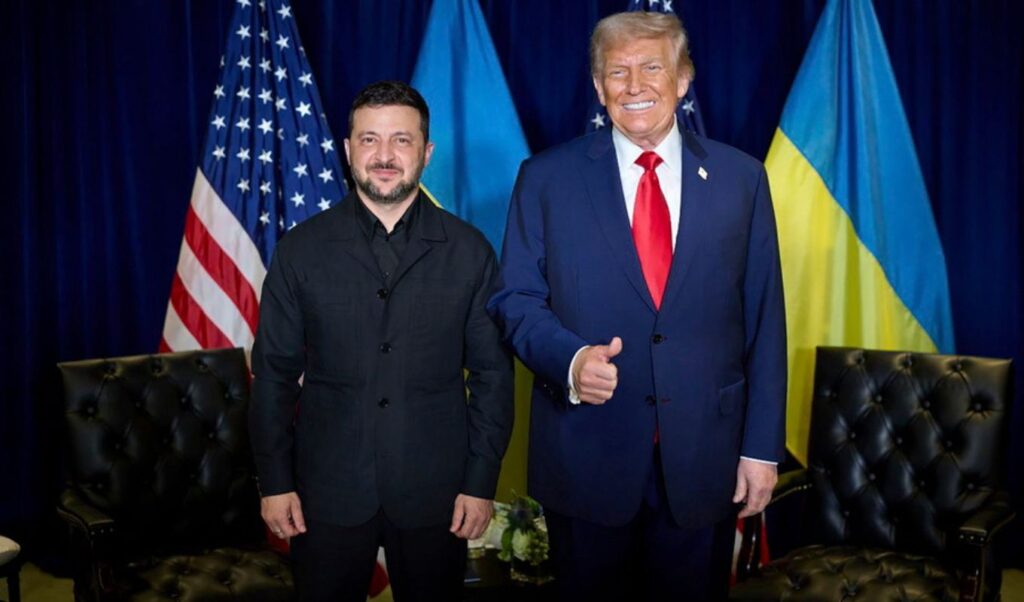There was great surprise at yesterday’s statements by Donald Trump regarding the war in Ukraine, with the American president making a 180-degree turn that bore no resemblance to the February “arm wrestling” at the White House when he had hosted Volodymyr Zelensky. The White House occupant, from the point where he told the Ukrainian president that he “doesn’t hold the cards,” essentially calling on him to accept fait accompli and the loss of territories of his country’s sovereignty, completely reversed his rhetoric, stating after yesterday’s meeting that Ukraine can regain all its territories with the help of the EU and NATO, “unleashing” fire against Russia for its “ineffective” campaign, even calling it a “paper tiger” facing economic issues.
At the same time, in continuation of his policy toward Kyiv and in contrast to Biden’s policy, he emphasized that “we will continue to provide weapons to NATO, for it to decide what it will do,” while repeating pressures on the European Union to eliminate the purchase of Russian hydrocarbons.
What Trump is aiming for
As the Axios website reported, this new position by Donald Trump appears to find resonance with domestic audiences. After all, as it notes, recalling related analyses of American powerplay, politics in Washington often constitutes a tug-of-war between “hawks” (with a more pro-war stance) and isolationist supporters, with the two currents coexisting both within the Republican party and within the MAGA movement. At this stage, the White House occupant seems to be approaching more closely the leading figures of the party in Congress, as several of them appeared to outbid each other.
“President Trump’s strong speech and today’s post show why he is the President of peace through strength,” stated Senate Intelligence Committee Chairman Tom Cotton (Republican from Arkansas), speaking to Axios. (Pro-Ukrainian) Senator Lindsey Graham (Republican from South Carolina) wrote on X that “Trump is right when he assesses that the Russian economy is under pressure and that this will worsen if we make the purchase of cheap Russian oil and natural gas toxic for those who choose this path.”
Senate Armed Services Committee Chairman Roger Wicker (Republican from Mississippi) stated for his part: “President Trump and I believe Ukraine can win – a fact that President Biden avoided mentioning for years. It’s time to intensify pressure on Putin to stop the bloodshed.”
Moreover, a bipartisan bill has been in the works for some time, awaiting the “green light” from the White House to proceed with imposing sanctions on Russia. Specifically, as Axios reminds us, the bill will impose economic sanctions on Moscow if Putin refuses to negotiate with Ukraine and will also impose a 500% tariff on products imported from countries that buy Russian oil.
Rubio “toned down” after Trump’s “disruptive” statement – Ambiguous declarations targeting NATO member states and Article 5
It should be noted, however, that this 180-degree turn by Trump on a rhetorical level regarding Ukraine’s “victory” and return to pre-war borders seemed to be “limited” by Marco Rubio’s statement, as the New York Times points out. The American Secretary of State and Security Advisor mentioned that the war in Ukraine “cannot end militarily,” predicting that this will happen at the “negotiating table.”
The American president’s ambiguous statements are also reflected in his responses regarding violations of NATO member states’ airspace by Russian aircraft: While he gave the “green light” for their downing by Alliance members, he was reserved in his answers regarding whether the US would offer its support in a conflict with Russia, as Article 5 of the Organization’s Charter provides: “It depends on the circumstances,” he stated.
The Kremlin’s response and VAT increase from Russia
The approach between Washington and Moscow that Donald Trump initiated has “almost zero results,” the Kremlin states, one day after the American president’s new sudden reversal that attacked Russia and supported Ukraine.
“In our relations (US-Russia), one goal is the elimination of friction factors (…). But this is progressing slowly. The results are almost zero,” Kremlin spokesman Dmitry Peskov said in an interview with the RBC radio network. He emphasized that Russia has no choice but to continue the war. Responding to Trump who called Russia a “paper tiger,” he gave assurance that his country is “stable.” He added, however, that “Russia faces tensions and problems in various sectors of the economy.”
At the same time, the Russian Ministry of Finance proposed on Wednesday (24/9) to increase the value-added tax rate from 20% to 22% in 2026, in order to finance military expenditures in the fifth year of the war in Ukraine. VAT represented 37% of federal budget revenues in 2024 and analysts estimate that the increase will generate about 1 trillion rubles (11.9 billion dollars) in additional revenue. Russia’s Ministry of Finance, which stated that tax increases will “primarily target defense and security funding,” said in its statement that it proposes other tax increases, including for gambling businesses. This proposal follows Vladimir Putin’s statement last week, who appeared open to raising certain taxes to cover economic needs during the war, noting that the United States had raised taxes on the wealthy during the Vietnam and Korea wars.




